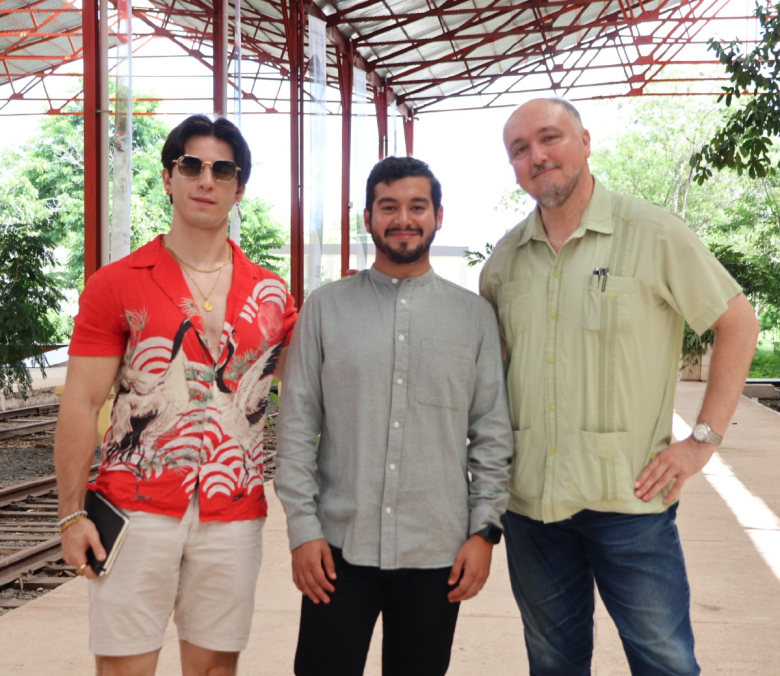
https://www.yucatan.com.mx/imagen/2025/09/24/llega-lejos-con-su-cine.html
For Yucatecan filmmaker Luis Quijano, love for cinema did not appear overnight; it slowly developed into a passion that eventually made him the director he is today.
In an interview with Diario de Yucatán, Quijano recalled how, as a child, his parents would take him every Sunday to the theaters at Siglo XXI to watch animated and live-action films. Everything changed one day when he walked into his parents’ room while they were watching Bride of Chucky. The film scared him, but at the same time sparked an interest in horror that would shape his career.
“I started watching horror movies with my mom, and that’s when my admiration for genre cinema began to grow. Now, 90% of the projects I make are horror or fantasy films.”
His main influences are Guillermo del Toro, Rob Zombie, and Alejandro Jodorowsky. “They each have very distinctive styles, with deeply human and personal stories. Rob Zombie is erratic, Guillermo del Toro’s films are more intimate, and Jodorowsky is completely surreal. Each has contributed something cultural and emotional to my creative process.”
In New York
Quijano recently presented his short film AVEM at the 2025 New York Latino Film Festival. The idea came while he was filming on the beach and saw a bird steal some chips from a couple. The couple ate the chips without hesitation, which made him wonder: “Aren’t they going to get sick from eating them? What if they turned into birds?”
The concept evolved into something deeper: “A bird flies, it’s free—it can arrive anywhere, eat something, and leave. A bird has no borders; it goes wherever it wants.”
From this came the metaphor of immigrants in the United States, who do not share that same freedom. “Years ago, I was living in the U.S. in a sort of limbo, between work permits and visas. That’s when I thought: what if I could fly? I could go wherever I wanted, whenever I wanted, without anything holding me back.”
Presenting AVEM in New York was especially meaningful for Quijano, as it was the first time he had screened one of his films in the city and at such a prestigious festival. “From day one it felt very welcoming. It wasn’t competitive—it was more like, ‘let’s watch films made by Latinos.’”
Reception
The reception from audiences was positive. “People recognize that these aren’t stories that get told very often. It’s a horror fiction project, but I try to keep it grounded in realism, approaching the theme with respect.”
For Quijano, the response was especially valuable for viewers who have lived experiences similar to those of the film’s protagonist, Andrés.
Still, the filmmaker admits the biggest challenge in bringing a short film from anywhere in the world to international audiences is financing. “Most of the time, investors in short films won’t make their money back. The purpose of a short is to get your name out there and showcase your work at festivals.”
Back in Mérida
On Wednesday, Quijano will screen AVEM in Mérida, alongside his other short films: Caminante, caminante: La leyenda del huay-chivo, Banana Boat Commercial, Caviar Star, All the Things, and a preview of his feature debut Me gusta más crudo.
The screening will take place at 7 p.m. in the Mayamax Hall of the Gran Museo del Mundo Maya, with free admission.
What’s Next
Looking ahead, Quijano has several projects on the horizon. “AVEM will be screened in Los Angeles and San Francisco this October. We’re also in post-production for my first feature film, which we hope to release by the end of next year.”*
To young Yucatecan filmmakers, he shared this advice: “Stories matter, and they deserve to be told. The most important thing is to believe in your story. Nowadays, even a cellphone can tell a good story. Believe 100% in the stories you want to tell, in your voice, and don’t let your resources hold you back.”
Juan de Dios Barrueta Rath, film director at the Universidad de las Artes de Yucatán, highlighted Quijano’s presence in Mérida, noting that he will also participate in a student film forum at the university the following day. “Artistic careers are often marathons of endurance. These kinds of events are crucial, as they let us see the experiences of other creators who have achieved their goals.”
— Karla Cecilia Acosta Castillo
- Share